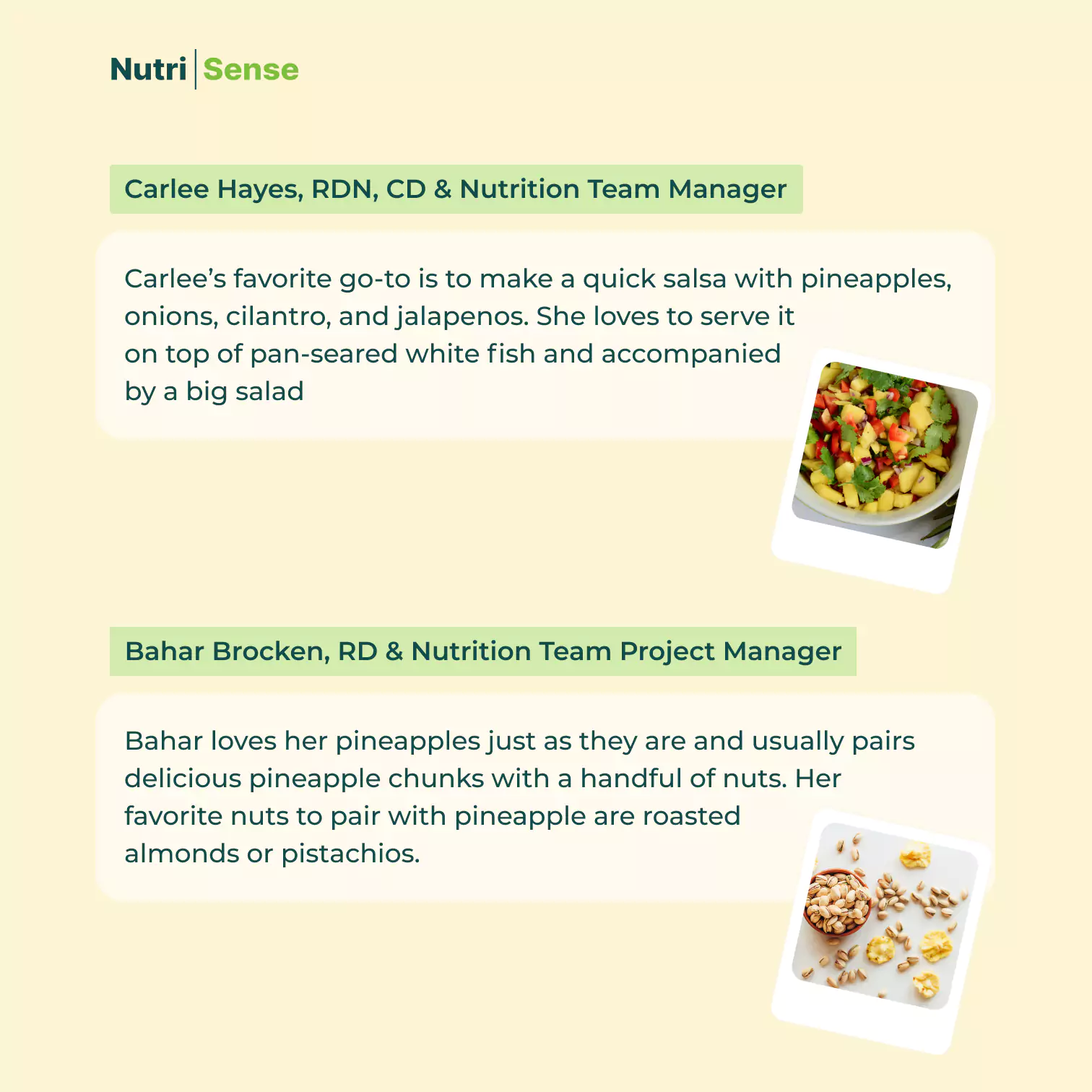Do Pineapples Raise Blood Sugar Levels?

Key Takeaways
A tropical fruit, the pineapple is famous for its spiky outside and juicy, sweet inside. Indigenous to South America, it’s also a popular addition to meats and sauces worldwide, makes a delicious salsa for salmon, and can be pretty divisive on a pizza.
Fresh pineapple is delicious, but there’s also pineapple juice, great on its own and even better in a Piña Colada! But how does pineapple do as part of a healthy diet?
What is its GI score, and does a slice of fresh pineapple count as a portion of healthy food? Is it high cholesterol, and what about its fiber content? Then, of course, there’s pineapples and blood glucose—can it be an excellent addition to a diabetes diet?
Well, as it turns out, pineapples can be a great addition to a healthy diet. Like other fruits, pineapples also contain natural sugars, vitamins, minerals, and fiber. Because of the natural sugar content, this sweet fruit can be a good option for those looking to satisfy their sweet tooth while maintaining a healthy diet.
So, should you add those pineapple chunks to your salad and sip on that pineapple juice without a care in the world? Are there any side effects to consuming the fruit or its fruit juice?
Read on to find out everything you need to know about pineapples, your health, and your blood glucose levels.
Is Pineapple Good for Diabetics?

If you have diabetes, there’s a good chance you’re a little skeptical of fruit. But if you have type 1 or type 2 diabetes, you may have been warned about certain fruits, and you may shy away from eating pineapples, in particular. So, are pineapples really that bad for blood glucose levels?
However, according to the American Diabetes Association, people with diabetes should eat various fresh foods, which may include some fruit. The answer is both yes and no—it depends on how much pineapple you eat and how it affects your blood sugar levels.
Pineapples may not have a low GI, but they’re not always on the high GI scale either—they vary! The whole fruit has a GI, or glycemic index of around 59 to 66, but could be as high as 82. Other factors that can affect the GI score are processing and ripening, so there can be a lot of variability here.
Remember that everyone’s body is different, so your response to the fruit can differ from someone else’s. It’s a good idea to speak with a healthcare provider or registered dietitian to find out whether pineapples are a good addition to your diet, especially if you have health conditions.
4 Nutritional Benefits of Pineapples

Not only are pineapples flavor-packed, but they pack a wealth of nutrients into each bite too. Here are some of the nutrients and vitamins that pineapples contain and why they are suitable for you:
1) Contain Antioxidants
Pineapples are rich in certain antioxidants such as flavonoids and phenolic acids. Antioxidants fight the build of free radicals in the body. Free radicals are molecules that contain unpaired electrons.
If you aren’t careful, they can rob other cells of electrons, causing cell and tissue damage and chronic conditions. Antioxidants can combat some of this and help prevent cancer, diabetes, and heart disease.
2) Good Source of Vitamins and Minerals

Pineapples pack a big nutritional punch. They are full of vitamins and minerals. Pineapples contain high amounts of manganese and are a good source of vitamin C. They also have high fiber content, vitamin B6, vitamin K, potassium, folate, iron, and copper.
Manganese is a mineral that occurs naturally in plants, and contains antioxidant-like properties. Vitamin C is an essential nutrient that improves your immune system, improves growth, and helps your body absorb some nutrients from the foods you eat.
3) Good Source of Carbohydrates
Carbohydrates are broken down from the foods we eat and are converted into sugars to be used as energy by your body. Luckily, fresh pineapples also have good fiber content, which will slow your body’s uptake of sugar into your bloodstream.
Compared to fresh pineapple, however, canned pineapples may have additional sugar added which may increase the overall sugar content. Avoid canned pineapple in syrup if you are on a low carbohydrate diet or need to carefully maintain your blood glucose levels.
You may also want to avoid drinking too much pineapple juice that can contain fructose or dried pineapple. Preserved fruits often have added sugars, so try to get your daily dose of fruit from fresh and whole fruits.
4) High in Fiber

One cup of pineapple contains approximately 10 percent of your daily fiber needs. Fiber is a vital part of your diet and is a carbohydrate that does not break down after you consume it. It may support healthy digestion.
It slows down the rate at which your body absorbs the sugars broken down from carbohydrates into your bloodstream. So, the high fiber content (one cup of fresh pineapple contains 2.3 grams of fiber) in pineapples is just another reason to add this fruit to a healthy meal plan.
Other Health Benefits of Pineapples

Did you know that pineapples offer some significant health benefits? Not only are they full of vitamins and minerals, but they also have many health-related benefits and may help prevent chronic diseases. Here are some of the ways that pineapples are good for your health and disease prevention:
1) Can Fight Inflammation
Pineapples are rich in the nutrient bromelain. Bromelain has been studied and found to reduce inflammation after consumption. Inflammation reduction can help prevent chronic disease and aid the body’s recovery process after injury, exercise, or medical procedures.
2) May Help Prevent Cancer

The anti-inflammatory properties that pineapples contain may help reduce your risk of developing cancer. Cancer is a disease that creates uncontrolled cell growth. Bromelain also encourages white blood cell functions. White blood cells are cells your body relies on to fight infection and disease.
3) May Support Weight Loss and Healthy Digestion

While research on this is scarce, and still ongoing, some of it suggests some links between eating pineapple and weight loss. This is due to the enzymes in the fruit like bromelain that are believed by some to support healthy digestion. Combined with the fiber in pineapples, the fruit may be an excellent addition to the foods you eat to maintain a healthy digestive system.
4) Can Relieve Arthritis Pain
Many different types of arthritis cause inflammation in and around the joints. Bromelain, which is found in pineapples, is known for its anti-inflammatory properties. Studies have shown that consuming bromelain may relieve pain just as effectively as pharmaceutical drugs. It is not a cure for arthritis, but eating pineapple may relieve arthritis-related pain.
5) May Boost Bone Health

Manganese promotes bone density and may be essential for maintaining strong, healthy bones. Pineapples are packed with this mineral. So, consuming a serving of the whole fruit several times a week may help you maintain your bone health, which is especially important post-menopause.
Adding Pineapple to Your Diet
Pineapple is a highly versatile fruit and can be used in almost any meal, paired with meats, veggies, and fish. It can be prepared in many different ways, from pineapple chunks to pineapple juice. Here’s a little more about how to incorporate the fruit into your diet.
How to Choose and Cut a Pineapple

When you’re choosing a pineapple at your local market, it should have a slightly sweet aroma, and you will know it is ripe when you gently tug a leaf at the top and it slips free.
Here are some easy steps to help you cut a pineapple:
- Slice off the top
- Let it rest upside down for 20-30 minutes
- Cut off the bottom
- Slice off the skin from the sides
- Cut it in half
- Cut it into quarters
- Cut diagonally to remove the core
- Cube it into the size you want
- Enjoy!
Our Favorite Ways to Eat Pineapple
Pineapples are an extremely versatile fruit and can be prepared in many different, tasty ways. Here are two of the Nutrisense Nutrition Team favorites:

Find the right Nutrisense programto turn insight into progress.
Go Beyond Glucose Data with Nutrisense
Your glucose can significantly impact how your body feels and functions. That’s why stable levels are an important factor in supporting overall wellbeing. But viewing glucose isn't enough. Nutrisense, you’ll be able to learn how to use your body's data to make informed lifestyle choices that support healthy living.
One-to-one coaching
Sign up to access insurance-covered video calls to work with a glucose expert: a personal registered dietitian or certified nutritionist who will help tailor your lifestyle and diet to your goals.
Monitor and measure what matters
With the Nutrisense CGM Program, you can monitor your glucose with health tech like glucose biosensors and continuous glucose monitor (CGM)s, and analyze the trends over time with the Nutrisense App. This will help you make the most informed choices about the foods you consume and their impact on your health.
Find your best fit
Ready to take the first step? Start with our quiz to find the right Nutrisense program to help you take control.

Heather is a Registered and Licensed Dietitian Nutritionist (RDN, LDN), subject matter expert, and technical writer, with a master's degree in nutrition science from Bastyr University. She has a specialty in neuroendocrinology and has been working in the field of nutrition—including nutrition research, education, medical writing, and clinical integrative and functional nutrition—for over 15 years.




